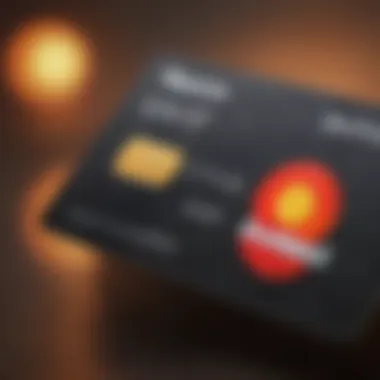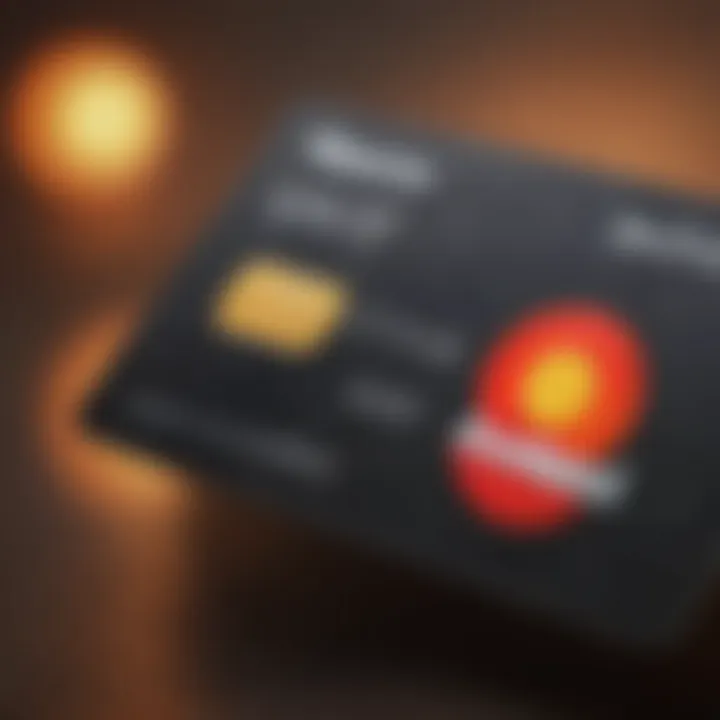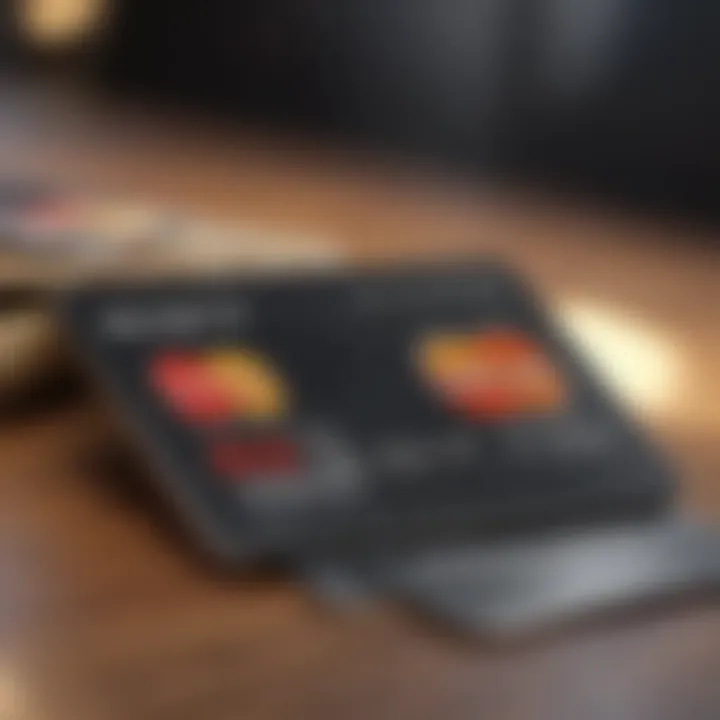Mastercard Options for Those Without Credit History


Intro
Navigating the labyrinth of financial products can be daunting, particularly if you're stepping into it without a credit history. A Mastercard can be a formidable tool for individuals aiming to establish or rebuild their financial reputation. However, understanding the ins and outs of obtaining one without an existing credit record is essential.
This article provides a thorough examination of the options available and sheds light on the implications of choosing the right Mastercard. Inspired by the unique needs of young professionals, families, and students, it offers actionable insights into how to secure a card, the types of cards that may suit you, and vital tips for managing financial responsibilities effectively.
Overview of Financial Product
Definition
A Mastercard is more than just a plastic card; it's a gateway to credit, providing individuals with the ability to make purchases, withdraw cash, and sometimes even earn rewards. There are various types of Mastercards designed to meet the diverse needs of consumers.
Key Features
- Global Acceptance: One of the standout features of a Mastercard is its widespread acceptance across millions of locations worldwide.
- Rewards Programs: Many Mastercards come with loyalty programs, offering cashback or points on every transaction.
- Security Features: Enhanced security measures like chip technology and fraud monitoring help protect cardholders from theft or fraud.
Purpose and Benefits
The primary purpose of obtaining a Mastercard without a credit history is to establish and build credit through responsible usage. Aside from that, having a credit card enhances your financial flexibility, allowing you to meet unforeseen expenses or emergencies.
Types and Categories
Credit Card Types
Mastercard offerings can be categorized as follows:
- Secured Mastercards: These require a security deposit, providing a safety net for the lender. Ideal for those with no credit history.
- Student Credit Cards: Tailored for college students, these often come with lower credit limits and beginner-friendly terms.
- Standard Mastercards: Traditional options for individuals who might have a slight credit history.
Pros and Cons
Pros
- Opportunity to build credit history.
- Potential rewards or cashback on purchases.
- Flexibility to make online transactions.
Cons
- Risk of accumulating debt.
- High interest rates compared to other financial products.
- Annual fees that may apply, depending on the card.
Situational Uses
A Mastercard can serve diverse purposes:
- Traveling: Using it internationally can avoid the hassle of currency exchange.
- Online Shopping: Enhances security when purchasing goods or services online.
- Building Credit: Regular, responsible usage can significantly enhance your credit score over time.
Application Process
Steps to Apply
- Research: Look for options tailored for individuals without credit histories.
- Check Eligibility: Each card will have specific requirements related to income or other metrics.
- Submit Application: Complete the online form with the required details.
- Await Approval: The issuer will review the application before granting approval.
Eligibility Requirements
- Age: Must be at least 18 years old (varies by state).
- Income Source: Proof of steady income, whether from employment or another source.
- Legal Status: Valid identification and proof of residency.
Documentation Needed
- Government-issued ID or passport.
- Recent pay stubs or bank statements.
- Social Security number for identification.
Common Mistakes to Avoid
- Applying for multiple cards at once, which can harm your credit score.
- Misunderstanding the terms and conditions of the card.
- Failing to read the fine print on fees and interest rates.
Tips for Success
- Start with secured Mastercards if you have no credit history.
- Make small purchases and pay them off consistently.
- Keep track of your spending to avoid exceeding your limit.
Costs and Fees
Types of Fees Associated
- Annual Fees: Some cards charge a yearly fee for maintenance.
- Foreign Transaction Fees: Added charges for purchases made outside your home country.
- Late Payment Fees: An extra charge incurred if you miss your payment deadline.
Interest Rates and APR for Loans/Cards
Understanding annual percentage rates (APR) is crucial. Many entry-level Mastercards can range significantly, so review APRs carefully before accepting the terms.


Comparisons of Costs Across Options
Research can aid in spotting options with lower fees or better rewards. Compare at least three different cards to see which fits your financial habits best.
Understanding Credit History
Having a solid understanding of credit history is crucial when you're stepping into the financing world, especially if you're looking to obtain a Mastercard without any previous credit experience. Your credit history is like a report card from the financial institutions. It holds details about your repayment habits, which can either serve as a red flag or a green light for lenders when evaluating your creditworthiness.
Credit history encompasses various elements. It not only records your loan payments but also factors in the length of time you’ve been borrowing, the type of credit accounts you have, and even the inquiries made about your credit score. All these bits and pieces come together to create a detailed narrative about your financial behavior over time. But let’s dive deeper into the components that construct this vital element of your financial identity.
What Constitutes Credit History
Your credit history can be broken down into several key components:
- Personal Information: This includes your name, address, and Social Security number. This info helps lenders identify you uniquely.
- Credit Accounts: Lenders report your borrowing activity to credit bureaus. This includes credit cards, personal loans, and mortgages. Each account will show its balance, payment history, and status.
- Payment History: This is the gold standard in your credit story. Lenders want to know when you've paid on time and if you've defaulted in the past.
- Credit Inquiries: When you apply for credit, lenders will look into your report. Each hard inquiry may slightly influence your credit score.
- Credit Utilization: Lenders also pay attention to how much of your available credit you are using. Lower utilization rates can signal good financial habits.
The Importance of Credit History
Understanding credit history is not just for securing a Mastercard; it’s pivotal for life decisions like buying a car or a house. A robust credit profile opens doors, allowing lenders to feel secure in offering loans with favorable terms. More than just numbers, this history represents financial responsibility and trustworthiness in the eyes of creditors. This trust is often reflected in lower interest rates, which can save you significant amounts over time.
"The history of your credit is your financial story told through numbers. Make sure it tells the tale of a responsible borrower."
Credit history’s importance extends beyond mere loan approvals; it can affect employment opportunities as well. Certain companies check credit scores during their hiring processes, particularly in finance and management roles. A good credit score could position you better in a competitive job market.
Consequences of a Lack of Credit History
Now, what happens if you lack a credit history? It can be akin to stepping onto the stage, only to find that the audience doesn't know who you are. The immediate consequence is likely to be a lack of options. When you're without a credit history, you'll find it harder to get approved for standard credit cards. This can leave you feeling stuck.
Moreover, even if you do manage to secure a card, you might be saddled with higher interest rates due to the perceived risk by lenders. They might see you as a gamble with uncertain repayment behavior. Alternatives such as secured credit cards might be the only feasible option, but they often come with lower credit limits, which can impede your spending flexibility.
In summary, understanding credit history is not just about getting a Mastercard; it serves as a foundation for your broader financial future. Grasping its components, recognizing its significance, and acknowledging what it means to lack it can steer you toward better financial decisions. As you continue your journey, keep this knowledge at the forefront, because it will be pivotal as you explore your options.
Mastercard Options for Individuals with No Credit
Navigating the financial landscape without a credit history can be like trying to read a map in the dark. But don't let that stop you. Various Mastercard options exist, providing a stepping stone for individuals without credit histories to build their financial credibility. These options not only allow you to manage day-to-day transactions but also serve as a pathway to a stronger credit profile down the road. Understanding these card offerings is pivotal in the journey towards financial independence.
Secured Credit Cards Explained
Secured credit cards are generally seen as the first rung on the credit ladder for those without credit history. Unlike traditional credit cards, they require a cash deposit that serves as your credit limit. For instance, if you deposit $500, that's your spending cap. This structure reduces the risk for issuers, making it easier for individuals in your position to qualify.
Most secured cards report to credit agencies, which is crucial as it helps you build or repair your credit over time. Regular usage paired with timely repayments creates a solid foundation for a good credit score. Just be mindful of the fees. Some secured cards can have high annual fees or other costs that can cut into your deposit, so it pays to read the fine print thoroughly before signing on the dotted line.
Student Credit Cards as a Pathway
For students, student credit cards are a gem in the realm of no credit options. These cards often come with more lenient eligibility criteria. If you're enrolled in an institution, you could qualify simply based on your status as a student. They also tend to offer lower interest rates and more forgiving terms, which can be a lifesaver if you’re juggling classes, work, and financial responsibilities.
With a student card, you can start building your credit history while enjoying perks like cashback on certain purchases or bonus points for spending in specific categories like groceries or gas, which is quite appealing. However, always remember that the goal is to use these cards wisely. It's best to avoid overspending, as student life can already be financially taxing.
Special Prepaid Mastercards
Special prepaid Mastercards can serve as a partial solution, though they're not technically credit cards. These cards allow you to load funds onto them, acting like a debit card. While you won't build a credit history with these, they help in managing your spending and keeping your budgeting in check.
Some prepaid cards even come with features that allow for direct deposits, online bill payments, or even added benefits like cash back on purchases. They can serve as a temporary measure while you wait to transition into a more traditional secured or student credit card. The downside? Since they don’t contribute to your credit score, think of them as a financial training wheel - useful but not a long-term fix.
In summary, selecting the right option involves understanding the pros and cons of each category and matching them to your financial situation. Whether you go for a secured card, a student card, or even a special prepaid Mastercard, each has its role in helping you gain financial footing.
Eligibility Criteria for Mastercard Applicants
When applying for a Mastercard, particularly for individuals without a credit history, understanding the eligibility requirements is crucial. These criteria lay the groundwork for who can successfully apply and what documentation or proof is necessary. Having a grasp on these details not only helps streamline the application process but also prepares applicants for potential hurdles.
Negative experiences can be common if one ventures into the application without the correct knowledge. As they say, "nothing ventured, nothing gained," but without eligibility clarity, one might just end up venturing into frustration instead.
Basic Requirements Overview
The first step in applying for a Mastercard typically involves meeting certain basic requirements. Generally, applicants need to be at least 18 years old and possess a valid Social Security number or another form of identification. This is where the rubber meets the road. Here a few basic requirements to keep in mind:
- Age Requirement: Applicants must be 18 years old or older.
- Valid Identification: A Social Security number or an equivalent form that the issuing bank recognizes.
- Residency: Proof of U.S. residency may be mandatory for many card options.
- Income Verification: Some proof of income is often required, whether it's part-time work, full-time work, or savings.
Keep in mind that some issuers may have additional stipulations based on their internal policies, which can vary broadly.
Income Verification
Income verification is often a linchpin in the Mastercard application process. Lenders need assurance that applicants can manage monthly payments as agreed. Depending on the type of card and the applicant's overall financial situation, different forms of income verification may be acceptable. Here are some potential forms:


- Pay Stubs: Recent pay stubs can serve as reliable proof of income.
- Bank Statements: Some applicants may choose to provide bank statements that show deposits.
- Tax Returns: Previous year’s tax returns can also be pivotal in showcasing income stability.
Being upfront about income sources is crucial. Some issuers might even want to see additional forms of financial support, like student loans or child support, to paint a broader picture of financial capacity.
Alternative Identification Forms
For many people without a credit history, traditional forms of identification may not be readily available. This is where alternative documents can step in to save the day. Depending on the lender, several types of identification may suffice:
- Government-Issued IDs: Like a passport or driver's license could be staples for many.
- Student Identification: If applicable, a student ID might also work, especially for student-focused credit avenues.
- Utility Bills or Lease Agreements: These can serve to prove residency, which could indirectly back an application.
Using various forms of identification may enhance the chances of being accepted. Being strategic in one's approach can make a significant difference in getting the desired card.
Having a solid understanding of the eligibility criteria helps one navigate the nuances of the application process. Knowing what to prepare and anticipating possible challenges make for better outcomes and greater confidence when applying.
Benefits of Obtaining a Mastercard
Obtaining a Mastercard, especially for those without a credit history, can be a pivotal step towards achieving financial independence. The benefits extend far beyond mere purchasing power. A Mastercard not only facilitates day-to-day transactions but also serves as a tool for building a solid financial foundation.
Building Credit History
One of the primary advantages of having a Mastercard is the opportunity to establish and grow a credit history. For those starting from zero, having a credit card can pave the way for creditworthiness. By using the card for everyday purchases—such as groceries, gas, or even streaming services—and making timely payments, individuals can gradually build a positive credit score over time. This is crucial because a good credit score is often a deciding factor when applying for loans, mortgages, or even rental applications.
Moreover, it reinforces responsible financial habits. Those without prior credit experience learn the significance of credit utilization, payment deadlines, and managing debt.
"Starting with a Mastercard is like laying the first brick in your financial house. It may take time, but with consistency, you can create something solid and lasting."
Convenience in Transactions
When it comes to convenience, a Mastercard offers unmatched flexibility. With modern lifestyles becoming more reliant on digital transactions, having a credit card simplifies spending. It eliminates the need for cash, which may not always be available or safe to carry.
Additionally, Mastercards are widely accepted around the globe. Whether traveling internationally or shopping locally, the card grants access to an extensive network of merchants. The convenience extends to online shopping too, allowing customers to make quick purchases without the hassle of fumbling with cash or checks. This ease of access provides peace of mind and enhances the overall buying experience.
Access to Rewards and Offers
Another significant benefit is the potential for accessing rewards and offers. Many Mastercard options come with perks like cashback on purchases, travel rewards, and discounts at participating retailers. Even with limited credit history, individuals can still take advantage of these opportunities.
- Cashback Rewards: Earn back a percentage of what you spend, which can be quite handy.
- Travel Benefits: Accumulate points that can be used for flights, hotel stays, or car rentals.
- Special Promotions: Access exclusive discounts at popular vendors and services.
Utilizing a Mastercard in everyday transactions allows users to not just spend but also to earn something in return, enriching their financial experience. This aspect makes acquiring a Mastercard a smart addition to any budget-conscious strategy.
Potential Challenges with No Credit History
Navigating the financial waters without a credit history can feel like sailing in a fog. While there are plenty of options available, it isn’t all smooth sailing. There are significant challenges that one needs to confront. This section explores the hurdles that individuals face when attempting to secure a Mastercard without any prior credit history. Understanding these challenges is essential—not just for making informed decisions, but also for preparing oneself to manage them effectively.
Higher Interest Rates
One of the first hurdles you might encounter is the issue of higher interest rates. Lenders generally view individuals without credit history as higher risk. To compensate for this perceived risk, they often impose elevated interest rates. This means that if you carry a balance on your card, borrowing costs can become quite steep. It’s like being hit by a double whammy; not only are you paying interest, but the amount accruing each month can really start to pile up.
- Consider how this impacts monthly budgeting. Having a higher interest rate can lead to paying significantly more over time. For instance, if you spend $1,000 on your card with an interest rate of 24%, you could end up forking over nearly $300 in interest charges within a year if you only made minimum payments. That’s money you could have used elsewhere.
- Always read the fine print. Many inexperienced borrowers overlook the Annual Percentage Rate (APR) when reviewing their Mastercard offerings. You sneakily sign up for a card thinking it's just a little higher than average, only to realize later that you’re in over your head.
Lower Credit Limits
Alongside higher interest rates, another key issue is lower credit limits. Credit cards for those without a history often come with significantly diminished spending power. This can feel like a drop in the bucket when you need flexibility for larger purchases or unexpected expenses. If your credit limit is just a few hundred dollars, it’s far from ideal for anyone who wants to build their financial reputation.
- How does this limit your spending? Picture it: You find that perfect couch, but it costs $800. If your credit limit is only $500, you’re left either finding a workaround or passing up an opportunity because your card won’t cover the full amount.
- Think twice about emergencies. A lower limit means that if you face an unexpected situation—like car repairs or medical bills—you might not have enough buffer to cover them without dipping into savings.
Limited Card Options
Finally, let’s talk about the chilling reality of limited card options. Not all Mastercards are created equal, and for those without credit history, choices can feel especially constricted. You might find yourself only qualifying for secured cards or those laden with fees and fewer perks. This can limit your ability to find a card that suits not just your financial needs, but also aligns with your lifestyle.
- Fewer rewards and benefits. A rewarding card usually offers cash back, travel rewards, or other benefits. However, many options that are available without a credit history simply don't have these features. It’s a little like ordering a pizza and finding out that all they have is plain cheese. Unsatisfying.
- Package deals can be more costly. In some cases, you might find that realistic offers include fees that exceed the typical costs, making it seem less appealing. One must weigh the pros and cons meticulously, as sometimes those deals sound great but can lead to regrettable decisions.
In summary, while the journey to obtaining a Mastercard with no credit history is filled with potential challenges, it's crucial to understand them. Awareness is the first step toward navigating these tricky waters and coming out stronger on the other side. With careful planning, responsible use, and vigilance, overcoming these hurdles is within reach.
Strategies to Build Credit with a Mastercard
In a world where credit scores play an essential role in financial health, having strategies to build credit with a Mastercard can make all the difference. This section outlines how individuals with no credit history can begin their journey towards establishing a solid credit score. Understanding these strategies not only empowers users with valuable knowledge but also helps them avoid pitfalls common among novices in the credit landscape.
Regular and Responsible Use
Utilizing a Mastercard regularly and in a responsible manner is a cornerstone of building credit. It’s not just about having a card; it's about making it work for you. One of the best ways to demonstrate your creditworthiness is to use your card for small purchases—perhaps groceries or monthly bills. Consistent usage shows creditors that you can manage your financies effectively. And let’s be honest, it can be a slippery slope when you start overspending, so keeping your charges within a reasonable range is key.
- Tip: Use only 30% or less of your available credit limit. This keeps your credit utilization ratio healthy, which plays a major role in your credit score.
- Reminder: Consider setting up alerts for your card transactions to help track your spending easily.


Making Timely Payments
This point cannot be emphasized enough: making timely payments is crucial. When it comes to building a positive credit history, punctuality in payments will speak volumes. Payment history is often considered the most important factor for credit scoring. So, it’s wise to set reminders or automate your payments.
"It's not enough to use your credit; you must respect its timeline—be prompt, or risk falling behind."
Additionally, paying the full balance each month ensures you avoid interest charges. Not prolonging debt is a smart move. Even if it means forgoing that new gadget for now, it will pay off in the long run as your credit history ages favorably.
Monitoring Credit Reports
Keeping an eye on your credit reports can't be overlooked. It’s like checking your pulse; if you don’t know where you stand, how can you improve? Requesting your report yearly is a good practice. Not only will this help you keep tabs on your credit score but it will also let you catch any errors or signs of identity theft early on.
- Where to check: You can easily access free annual credit reports through websites like AnnualCreditReport.com.
- What to look for: Ensure that all accounts listed are accurate, double-check payment history, and scrutinize any unpaid debts that should have been cleared.
Knowing your credit status puts you in control as you build your initial credit history. This proactive approach ensures any missteps can be corrected before they affect larger financial decisions.
Alternatives to MasterCard for No Credit History
For many, credit cards, specifically MasterCards, serve as the backbone of financial flexibility and responsibility. However, not everyone has the luxury of an established credit history to rely on. This puts individuals in a tough spot, necessitating a careful exploration of alternatives that provide similar benefits without locking them into the complexities of credit cards. Understanding these alternatives is crucial for anyone looking to enhance their financial standing without the weight of no credit history.
Debit Cards with Credit-Like Features
Debit cards have evolved significantly over recent years. Unlike traditional debit cards that merely access funds from a checking account, some now offer features similar to credit cards. These debit cards with credit-like features allow users to build credit in a more straightforward fashion.
- Cash Back Rewards: Certain debit cards give cash back on purchases, which can incentivize regular use and financial discipline.
- Monthly Reporting: Some issuers report usage to credit bureaus, meaning consistent transactions can positively impact your credit score.
- Online Shopping Safety: These cards often come with additional protections for online transactions, which is a nice touch for the tech-savvy shopper.
Being mindful of the details provided by your bank regarding reporting is essential. Not all debit card providers report to credit agencies, making it a question of how well it will serve the purpose of building a credit history.
Personal Loans for Building Credit
Another route to consider is taking out personal loans specifically aimed at enhancing credit. These loans can be quite effective if utilized responsibly and come with their own set of advantages.
- Establishing Payment History: By taking a personal loan and making consistent payments, you demonstrate your reliability to lenders.
- Fixed Terms: Most personal loans have a defined repayment schedule, making it easier to track and manage payments.
- Wide Use of Funds: Unlike some credit cards or specialized loans, personal loans can typically be used for various purposes, from consolidating debt to covering unexpected expenses.
However, it is vital to distinguish between secured and unsecured loans. Secured loans require collateral, like a vehicle or savings account, while unsecured loans do not. Considering the implications of each type of loan regarding risk and credit impact is crucial before taking the plunge.
Credit Builder Loans
Lastly, credit builder loans present another compelling option for those without a credit history. These loans are designed specifically to help individuals establish or improve their credit.
- Purpose-Specific: A credit builder loan essentially deposits the amount loaned into a secured savings account. The borrower makes monthly payments towards this loan, and once fully paid, the funds are released to them.
- Credit Score Impact: Since this payment history is reported to credit bureaus, timely payments can help build a credit profile effectively.
- Encourages Savings: This type of loan not only builds credit but also encourages saving, which can be beneficial in financial planning.
By understanding these alternatives, individuals can more effectively navigate the path towards establishing creditworthiness without jumping straight to a Mastercard or any other credit card. Each option has its strengths and can cater to various financial situations. As always, consider your personal circumstances, and weigh the pros and cons judiciously before making a decision.
Final Considerations Before Applying
When it comes to applying for a Mastercard without a prior credit history, it's not just a walk in the park. Understanding what lies ahead and weighing it all can make a world of difference in decision-making. This section dives into the vital aspects to mull over before taking the plunge.
Understanding Terms and Conditions
Before diving into the pool of options, it’s crucial to wade through the terms and conditions laid out by the credit issuer. Often, these documents read like a foreign language, filled with legalese that can twist the mind. However, breaking it down can save you from regret down the line.
Pay attention to:
- APR (Annual Percentage Rate): It’s the cost of borrowing expressed as an annual rate. Higher rates can put a dent in your pocket, especially if you're already navigating through a shaky financial ground.
- Fees and Charges: Look for annual fees, late payment fees, and foreign transaction charges, if applicable. These can quickly turn your initial excitement into a financial burden.
- Credit Limits: Ensure you understand the maximum amount you can charge. A limit that’s not aligned with your needs can lead to inconvenient scenarios.
Taking the time to understand these elements will arm you with the knowledge to manage your finances efficiently. As they say, knowledge is power.
Assessing Affordability
Next up, assessing whether you can genuinely afford to take on a Mastercard. It's not just about making monthly payments, but also about considering your overall financial health. Is there room in your budget for the payments? Are you ready to navigate through potential fees?
There are a few steps to tackle this:
- Budget Review: Scrutinize your income and expenditures. Are your expenses creeping up or are they manageable? Set aside a portion of your monthly budget to cover anticipated credit card payments.
- Emergency Fund: Before you commit, ensure you have some savings set aside. Life can throw curveballs; having a cushion can prevent you from falling into a financial rabbit hole.
- Lifestyle Evaluation: Consider your current lifestyle. Do you foresee any changes that could affect your ability to make payments? Consider all variables, big and small.
It’s easy to get swept up in the excitement of having a credit card, but proper assessment can mean the difference between confidence and chaos.
Evaluating Long-Term Financial Goals
Finally, it’s imperative to look ahead and evaluate how a Mastercard fits into your grand financial picture. This is not a short-term game; it’s about building a bright financial future.
Think about your goals:
- Building Credit: One of the prime reasons for getting a Mastercard is to start building your credit history. Consider how responsible credit usage will contribute to future goals, like buying a house or car.
- Debt Management: If you have other debts, how will this card play into your repayment strategy? Balancing multiple debts requires sticky planning.
- Financial Fitness: Reflect on the kind of financial health you wish to achieve. This card can be a tool for growth, but it’s essential to align its use with your long-term aspirations.
By taking a step back and contemplating these aspects, you can make a decision that is not only informed but also beneficial for your financial journey.
Remember: The goal is not just to get a credit card, but to wield it as a weapon for financial empowerment.



